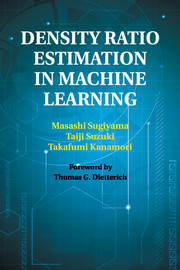Book contents
- Frontmatter
- Contents
- Foreword
- Preface
- Part I Density-Ratio Approach to Machine Learning
- Part II Methods of Density-Ratio Estimation
- Part III Applications of Density Ratios in Machine Learning
- Part IV Theoretical Analysis of Density-Ratio Estimation
- Part V Conclusions
- List of Symbols and Abbreviations
- Bibliography
- Index
Preface
Published online by Cambridge University Press: 05 March 2012
- Frontmatter
- Contents
- Foreword
- Preface
- Part I Density-Ratio Approach to Machine Learning
- Part II Methods of Density-Ratio Estimation
- Part III Applications of Density Ratios in Machine Learning
- Part IV Theoretical Analysis of Density-Ratio Estimation
- Part V Conclusions
- List of Symbols and Abbreviations
- Bibliography
- Index
Summary
Machine learning is aimed at developing systems that learn. The mathematical foundation of machine learning and its real-world applications have been extensively explored in the last decades. Various tasks of machine learning, such as regression and classification, typically can be solved by estimating probability distributions behind data. However, estimating probability distributions is one of the most difficult problems in statistical data analysis, and thus solving machine learning tasks without going through distribution estimation is a key challenge in modern machine learning.
So far, various algorithms have been developed that do not involve distribution estimation but solve target machine learning tasks directly. The support vector machine is a successful example that follows this line – it does not estimate data generating distributions but directly obtains the class-decision boundary that is sufficient for classification. However, developing such an excellent algorithm for each of the machine learning tasks could be highly costly and difficult.
To overcome these limitations of current machine learning research, we introduce and develop a novel paradigm called density-ratio estimation – instead of probability distributions, the ratio of probability densities is estimated for statistical data processing. The density-ratio approach covers various machine learning tasks, for example, non-stationarity adaptation, multi-task learning, outlier detection, two-sample tests, feature selection, dimensionality reduction, independent component analysis, causal inference, conditional density estimation, and probabilitic classification. Thus, density-ratio estimation is a versatile tool for machine learning. This book is aimed at introducing the mathematical foundation, practical algorithms, and applications of density-ratio estimation.
- Type
- Chapter
- Information
- Density Ratio Estimation in Machine Learning , pp. xi - xiiPublisher: Cambridge University PressPrint publication year: 2012



